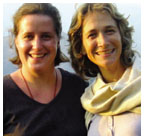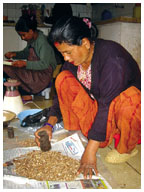|
Web Exclusives: Alumni Spotlight September 15, 2004:
From Kathmandu, Carroll Dunham ’85 and Nina Henning ’96 sell herbal products worldwide For generations people living in remote mountainous regions of Nepal have gathered wild herbs used for healing and medicinal purposes. Carroll Dunham ’85, who has lived in the Himalayas since graduating from college and has long been fascinated by the indigenous tradition of aroma therapy — the use of scents to bring about mental and physical well-being — decided to harness that practice. In 1995 Dunham, who wanted to help poor women in rural communities generate income, founded Wild Earth, a small company that produces and markets handcrafted Himalayan herbal products. The women who work with Dunham harvest herbs such as amalaki, ashwaghanda, and Indian spikenard, and then mix them with oils in large glass containers in Wild Earth’s workshop in Kathmandu, Nepal. The women make massage oils, soaps, rubs, and scrubs. “I am sort of a wacky alchemist or witch,” says Dunham, who travels the world helping people to understand that “bathing is more than just throwing water on us.” Dunham, who first traveled to Nepal during her junior year at Princeton to research her thesis on Asian religions for the anthropology department, learned from traditional Tibetan herbal healers about growing and harvesting herbs. She also has studied women’s health, yoga, and meditation, and is writing a book on Tantra, a Tibetan philosophy. Among Wild Earth’s products are scented herbal soaps that are supposed to reduce stress, pillows said to sexually arouse, and scented oils designed to relax muscles. Wild Earth (www.wildearthnepal.com/ourstory.asp) sells to Body Shop outlets, spas, and to smaller specialty stores around the world. Three years ago Wild Earth went into debt, says Dunham, who says she lacked business acumen. But the company survived thanks to Jean “Nina” Henning ’96, a Princeton-in-Asia intern assigned to Wild Earth, who helped get it back on its feet. Henning completed her internship last fall but has stayed on, falling in love with the culture and people of Nepal. Today she manages Wild Earth’s day-to-day operations. Women who work for Wild Earth make on average $65 a month, which is double what they would make at other jobs available to them. Married to an American, with two sons, Dunham lives in Kathmandu down a dirt road from Wild Earth’s workshop, in a compound with two Nepalese families. She grows her own vegetables and spends summers in Mongolia, traveling with family and friends. They live in yurts (which are similar to tents), bathe in rivers, and ride wild horses. Where another person might see poverty and despair in this politically
unstable nation, Dunham sees something more. “To me there’s
a lot of ways to describe wealth,” she says. “Materially,
Nepal may be considered a very poor country, but its wealth of tradition,
and culture and spiritual life are very alive and well.” By K.F.G.
|
||


